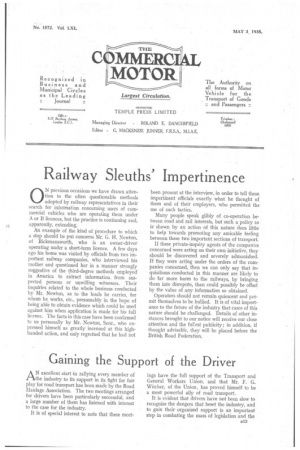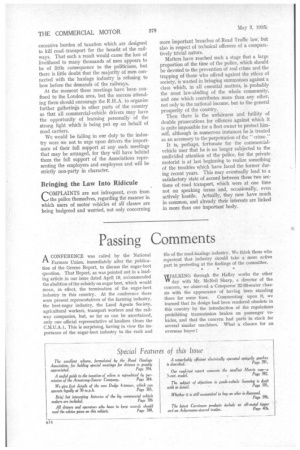Gaining the Support of the Driver
Page 27

Page 28

If you've noticed an error in this article please click here to report it so we can fix it.
AN excellent start -in rallying every member of the industry to its support in its fight for fair play for road transport has been made by the Road Haulage Association. The two meetings arranged for drivers have been particularly successful, and a large number of them has listened with interest to the case for the industry.
It is of special interest to note that these meet ings have the full support of the Transport and General Workers Union, and that Mr. F. G. Witcher, of the Union, has proved himself to be a most powerful ally of road transport.
It is evident that drivers have not been slow to recognize the dangers that beset the industry, and to gain their organized support is an important step in combating the mass of legislation and the excessive burden of taxation which are designed to kill road transport for the benefit of the railways. That such a result would cause the loss of livelihood to many thousands of men appears to be of little consequence to the politicians, but there is little doubt that the majority of men connected with the haulage industry is refusing to bow before the demands of the railways.
At the moment these meetings have been confined to the London area, but the success attending them should encourage the R.H.A. to organize further gatherings in other parts of the country so that all commercial-vehicle drivers may have the opportunity of learning personally of the strong fight which is being put up on behalf of road carriers.
We would be failing in our duty to the industry were we not to urge upon drivers the importance of their full support at any such meetings that may be arranged, for they will have behind them the full support of the Associations representing the employers and employees and will be strictly non-party in character.
Bringing the Law Into Ridicule
rOMPLAINTS are not infrequent, even from the police themselves, regarding the manner in which users of motor vehicles of all classes are being badgered and worried, not only concerning more important breaches of Road Traffic law, but also in respect of technical offences of a comparatively trivial nature. Matters have reached such a stage that a large proportion of the time of the police, which should be devoted to the prevention of real crime and the trapping of those who offend against the ethics of society, is wasted in bringing summonses against a class which, in all essential matters, is probably the most law-abiding of the whole community, and one which contributes more than any other, not only to the national income, but to the general prosperity of the country. Then there is the unfairness and futility of double prosecutions for offences against which it is quite impossible for a fleet owner to protect himself, although in numerous instances he is treated as an accessory to the perpetration of the "crime."
It is, perhaps, fortunate for the commercialvehicle user that he is no longer subjected to the undivided attention of the police, for the private motorist is at last beginning to realize something of the troubles which have faced the former during recent years. This may eventually lead to a satisfactory state of accord between these two sec , tions of road transport, which were at one time not on speaking terms and, occasionally, even actively hostile. Actually, they now have much in common, and already their interests are linked in more than one important body.




























































































